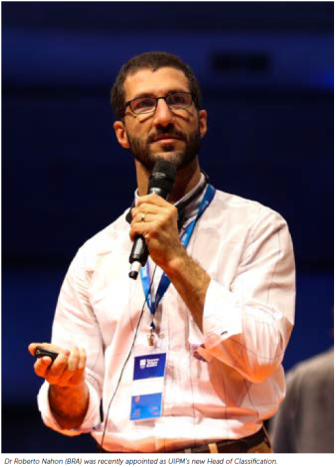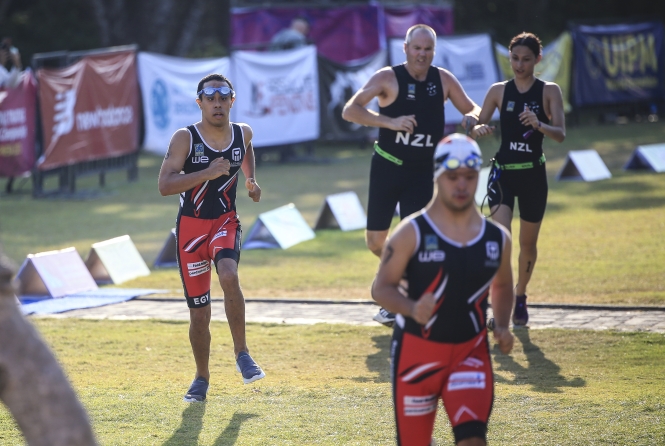UIPM Para Sports Spotlight: Q&A with Dr Roberto Nahon, UIPM Head of Classification
As UIPM continues to focus on ensuring its sports are both innovative and inclusive, the development and focus on Para Sport initiatives continues apace. Recently, vastly experienced Dr Roberto Nahon was appointed as UIPM’s new Head of Classification.
In this key role Dr Nahon, who has previously worked as Chief Medical Officer of the Brazilian Olympic Committee, will be a driving force of UIPM’s continued development and changes in Para Sport classification. Dr Nahon sat down for an interview soon after taking up his new role…

Congratulations on your appointment. What aspects of this role are you most looking forward to?
Several elements of this position particularly enthuse me. To begin with, I am afforded the unique opportunity to contribute to the promotion of a para-sport within Modern Pentathlon that I have long admired. This is especially significant to me, having had the privilege to collaborate with esteemed pentathletes in Brazil, including Yane Marques.
Furthermore, I am invigorated by the prospect of supporting UIPM’s dedication to inclusivity and the endeavor to make the sport universally accessible. This commitment resonates deeply with my personal ethos. I am convinced that establishing avenues for athletes with disabilities is not merely beneficial for the advancement of para-sport but is crucial for the holistic development (including non-athletes) and impact of the sport at large. Additionally, the Modern Pentathlon, with its amalgamation of diverse disciplines requiring both physical and mental excellence, presents a unique appeal. Promoting this and facilitating participation, particularly among para-athletes, represents a dual challenge (a professional and personal) that I am eager to tackle.
What will your initial months in this position entail?
My primary focus during the initial phase will be to integrate myself with the extensive work that has already been undertaken, a collaboration spanning multiple people and countries. I intend to dedicate time to learning from my colleagues, comprehending UIPM’s strategic objectives, and acquainting myself with the various aspects that UIPM encompasses, including its role in both Paralympic and Olympic integration.
A tangible outcome of this collaboration has been the development of a new approach to classification. It includes different classes and minimum eligible criteria for Para-Pentathlon. This innovative approach maintains a criterion for inclusion in the sport, while simultaneously simplifying the classification process to ensure it does not act as a barrier to entry.
Can you tell us about some of the long-term goals and targets you have?
My overarching ambition is to help position UIPM as a frontrunner in the global promotion of Modern Pentathlon, with a strong focus on inclusivity and accessibility. I envision UIPM cultivating a broad-reaching community that equally embraces Olympic and Paralympic athletes, fostering unity and camaraderie among diverse participants.
To be more specific, I aim to expand our participant base, including the induction of new athletes and the inclusion of new countries, from a sports development perspective and in collaboration with the UIPM Para Pentathlon Commission. From a classification standpoint, the goal is to pursue continuous improvement through the application of data-driven strategies, refining our approach to better serve our athletes and our sport.

Making sport accessible to all is obviously a key aim. How does classification play a part in that?
Classification systems serve as the backbone for fair competition in Para sports, such as Para-Pentathlon, by classifying athletes based on the nature and degree of their impairments, focusing on what athletes can do rather than what they cannot. This differentiation facilitates the establishment of competitive classes, ensuring that athletes with varying levels of ability can compete equitably, without undue advantage or disadvantage.
While discussing fairness in competitive sports can be challenging, it’s crucial to recognize that beyond fostering competition, classification also ensures that training programs and facilities are inclusive, addressing the diverse needs of athletes. The development and consistent application of classification systems are vital in guaranteeing that every athlete, regardless of their competition level, has an equal opportunity to participate and excel.
What possibilities can the new Obstacle movement within UIPM create for the para movement?
The new Obstacle discipline comes at a critical juncture, especially for the Para-Pentathlon movement, which is currently transitioning to a “new approach”, for which the final aim is a data-driven classification system. This timing is crucial as it allows any new initiative, such as the new Obstacle, to benefit from and contribute to this period of data collection and system refinement.
The integration of something as innovative as Obstacle not only takes advantage of this pivotal moment but also promises to accelerate the development of both the new discipline and the evolving classification system. This synergy is expected to enhance the sport’s inclusivity and accessibility, making it a win-win for the development of the sport and its athletes.



